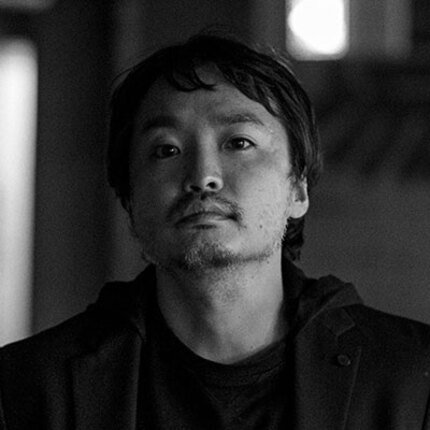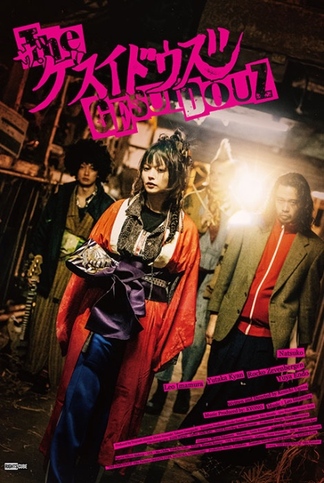Toronto 2024 Interview: THE GESUIDOUZ Director Kenichi Ugana Talks Punk, Transnationalism, and Childhood

If you're a genre fiend with a taste for the low-budget and oddball, you might have noticed Kenichi Ugana's name appearing time and again over the past few years at festivals such as Fantasia, Japan Cuts, and Nippon Connection. With his career beginning only a decade ago, the director of Visitors and Love Will Tear Us Apart has been astoundingly prolific, with four new films released within the past twelve months.
Now, Ugana has been unleashed upon the audience at TIFF's Midnight Madness, the most prestigious international stage that a quirky Japanese genre comedy has seen in some time. The film in question is The Gesuidouz, a low-key but appropriately noisy farce about a group of aspiring punk musicians and their love of horror films.
Rehearsing in tatami rooms and performing flanked by vegetable farms, they're unmistakably Japanese, but they yell about Dario Argento, Kurt Cobain, and Glastonbury. It's an international film for an international festival.
The other side of the Toronto screenings, I sit down with Kenichi Ugana over Zoom. He's all smiles and in high spirits. The film's been well-received, and he knows he's made a crowd-pleaser. In an illuminating conversation, we discuss his love of horror cinema, how he crafted a uniquely international punk fusion, and his hilariously unconventional upbringing.
Underdog band movies are commonplace in Japanese cinema. What were the first creative seeds of this project, and what did you feel was going to differentiate THE GESUIDOUZ?
I love music a lot. My first feature was originally going to be about a band, so I’ve been wanting to do this for a long time. I also love horror films, so I mixed those two elements in this film.
I think the combination of horror and music sets it apart. Of course, there are some films, like How to Talk to Girls at Parties for example. Also, I wanted to show the process of music being made. There are some other films that show the process of making one song, for example Godard’s One Plus One (Sympathy for the Devil), but I don’t think there are many other films like that.
There's a scrappiness and simplicity to your films that I really admire. How long do you spend developing the script or rehearsing with your actors before you shoot? Is there much improvisation?
I wrote the initial draft in one week. The finished script took me two or three weeks.
I don’t do script readings with actors, because I like to have an unexpected element to the shoot. So we didn’t really practice anything. For the band practice, we did it multiple times. But I like improvising. There’s a lot of improvisation in my films.
The style and tempo of humor in your performances is highly unique to your films. How do you direct your actors to get them all into that same mindset, where they're each embodying the same kind of comedy?
First, I told them to watch the films of Aki Kaurismäki and Roy Andersson, my favourite comedic directors. During the shoot, I let them perform once, and then if I found something that I wanted them to change, I’d tell them, so that they could take the performance in a different direction. But I considered their personalities and tried to direct them so that it gets funnier.

What attracts you to punk? In the film, punk is described as being like miso soup.
People may think that punk is a noisy and violent thing. For me, punk is a kind thing and can help those who are feeling weak. That’s why I love punk, and that’s why the band members need punk.
Cinephilia is core to this film. The characters talk about horror films new and old, mainstream and independent. Film titles are namedropped in the band's songs, and horror movie posters paper the walls.
Are those posters yours? And how has your love of film inspired you and shaped your own filmmaking?
Some of the posters are mine. I explained to the art department that this band would love films like this and music like that, so they collected posters according to that brief.
This film is about the process of making art, so naturally it’s filled with my love towards films. My mother loved splatter films. When I was a little kid, I saw splatter films with her, so my childhood experience informs this film.
Core to the film also is a contrast between traditional Japanese culture and the more international punk culture of the youth. I'd love to hear your reflections on that aspect of the film.
Many Japanese people love punk music, but they tend to get hooked on British or American punk. I wanted to mix both cultures. That’s why, in my film, characters will wear a kimono or a yukata and pair it with a jersey. It’s sort of a grunge punk.
They also use a tatami room as a music studio and have gigs at a cow farm. I wanted to create a new kind of Japanese punk movie.
Speaking on the international element of the film, how did you and Rocco Zevenbergen meet? How did he end up acting in your film?
My film Visitors was selected for the TromaDance Film Festival [in 2022]. Lloyd Kaufman leads the programming there.
Rocco was Lloyd’s assistant and a programmer at the festival. I met him when I attended the festival, and we became friends. I learned that he’s an American filmmaker, and that he also acts in his own films. I thought he was interesting, so I cast him.
Premiering at Toronto International Film Festival is a major achievement that you should be proud of. It's a surprising one as well. How do you feel about where the international reception and awareness of contemporary Japanese cinema is at currently? I feel like your film, being an unusual independent genre picture, premiering at TIFF is a big change.
I think Japan has been making strong genre films, but in the last few years it’s become harder to make them. With this in mind, I’m so happy that my film got into TIFF Midnight Madness. It’s the festival that I’ve always wanted to come to, so I feel very honoured.
But I shouldn’t feel satiated by this result. I want to keep making good films. If I make another music film, I want to go to Glastonbury.
The Gesuidouz enjoyed its world premiere at the Toronto International Film Festival in the Midnight Madness strand on 12th September.







